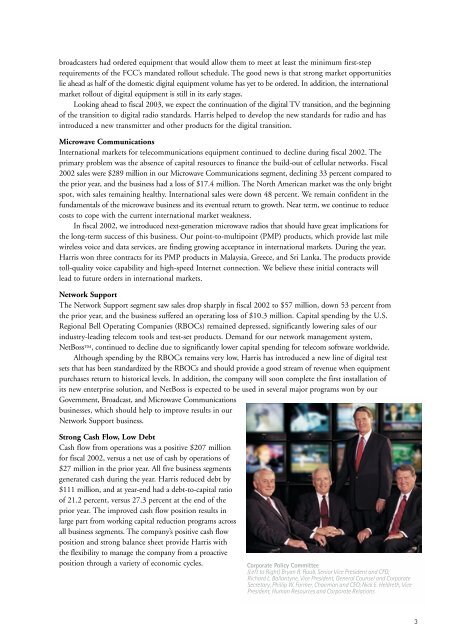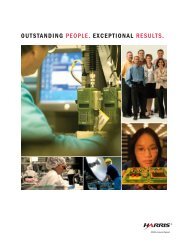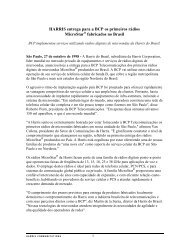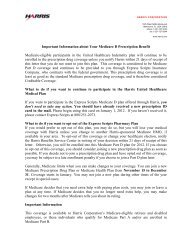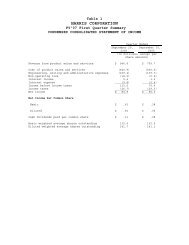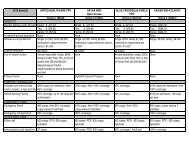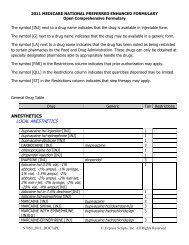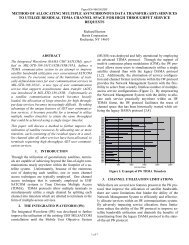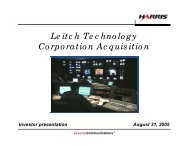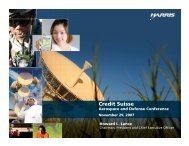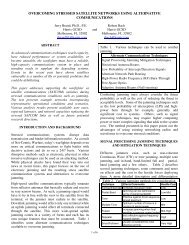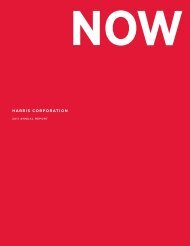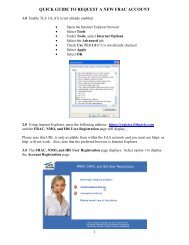Harris 2002 Annual Report
Harris 2002 Annual Report
Harris 2002 Annual Report
Create successful ePaper yourself
Turn your PDF publications into a flip-book with our unique Google optimized e-Paper software.
oadcasters had ordered equipment that would allow them to meet at least the minimum first-step<br />
requirements of the FCC’s mandated rollout schedule. The good news is that strong market opportunities<br />
lie ahead as half of the domestic digital equipment volume has yet to be ordered. In addition, the international<br />
market rollout of digital equipment is still in its early stages.<br />
Looking ahead to fiscal 2003, we expect the continuation of the digital TV transition, and the beginning<br />
of the transition to digital radio standards. <strong>Harris</strong> helped to develop the new standards for radio and has<br />
introduced a new transmitter and other products for the digital transition.<br />
Microwave Communications<br />
International markets for telecommunications equipment continued to decline during fiscal <strong>2002</strong>. The<br />
primary problem was the absence of capital resources to finance the build-out of cellular networks. Fiscal<br />
<strong>2002</strong> sales were $289 million in our Microwave Communications segment, declining 33 percent compared to<br />
the prior year, and the business had a loss of $17.4 million. The North American market was the only bright<br />
spot, with sales remaining healthy. International sales were down 48 percent. We remain confident in the<br />
fundamentals of the microwave business and its eventual return to growth. Near term, we continue to reduce<br />
costs to cope with the current international market weakness.<br />
In fiscal <strong>2002</strong>, we introduced next-generation microwave radios that should have great implications for<br />
the long-term success of this business. Our point-to-multipoint (PMP) products, which provide last mile<br />
wireless voice and data services, are finding growing acceptance in international markets. During the year,<br />
<strong>Harris</strong> won three contracts for its PMP products in Malaysia, Greece, and Sri Lanka. The products provide<br />
toll-quality voice capability and high-speed Internet connection. We believe these initial contracts will<br />
lead to future orders in international markets.<br />
Network Support<br />
The Network Support segment saw sales drop sharply in fiscal <strong>2002</strong> to $57 million, down 53 percent from<br />
the prior year, and the business suffered an operating loss of $10.3 million. Capital spending by the U.S.<br />
Regional Bell Operating Companies (RBOCs) remained depressed, significantly lowering sales of our<br />
industry-leading telecom tools and test-set products. Demand for our network management system,<br />
NetBoss™, continued to decline due to significantly lower capital spending for telecom software worldwide.<br />
Although spending by the RBOCs remains very low, <strong>Harris</strong> has introduced a new line of digital test<br />
sets that has been standardized by the RBOCs and should provide a good stream of revenue when equipment<br />
purchases return to historical levels. In addition, the company will soon complete the first installation of<br />
its new enterprise solution, and NetBoss is expected to be used in several major programs won by our<br />
Government, Broadcast, and Microwave Communications<br />
businesses, which should help to improve results in our<br />
Network Support business.<br />
Strong Cash Flow, Low Debt<br />
Cash flow from operations was a positive $207 million<br />
for fiscal <strong>2002</strong>, versus a net use of cash by operations of<br />
$27 million in the prior year. All five business segments<br />
generated cash during the year. <strong>Harris</strong> reduced debt by<br />
$111 million, and at year-end had a debt-to-capital ratio<br />
of 21.2 percent, versus 27.3 percent at the end of the<br />
prior year. The improved cash flow position results in<br />
large part from working capital reduction programs across<br />
all business segments. The company’s positive cash flow<br />
position and strong balance sheet provide <strong>Harris</strong> with<br />
the flexibility to manage the company from a proactive<br />
position through a variety of economic cycles.<br />
Corporate Policy Committee<br />
(Left to Right) Bryan R. Roub, Senior Vice President and CFO;<br />
Richard L. Ballantyne, Vice President, General Counsel and Corporate<br />
Secretary; Phillip W. Farmer, Chairman and CEO; Nick E. Heldreth, Vice<br />
President, Human Resources and Corporate Relations<br />
3


